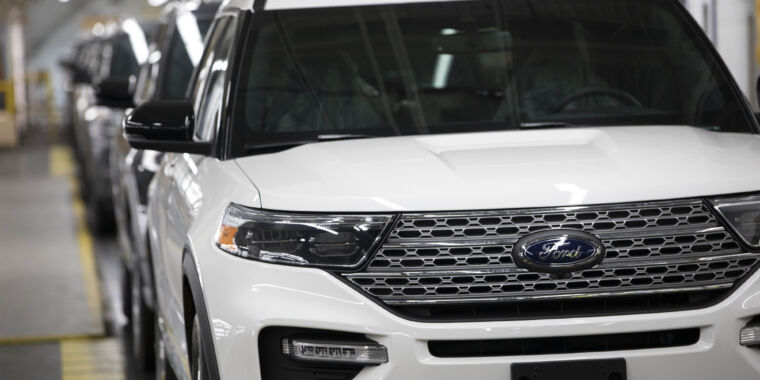
Enlarge / A Ford Explorer sports utility vehicle (SUV) sits for a final inspection at the Ford Motor Co. Chicago Assembly Plant in Chicago on Monday, June 24, 2019.
Daniel Acker / Bloomberg
Ford’s new Explorer has had a rocky few years. Its rushed initial launch was marred by production problems that resulted in several recalls. When the chip shortage hit, Ford idled the Chicago Assembly Plant for four weeks last July and for another week in February.
Now, the chip shortage has struck the Explorer again, this time in the back seat. Ford has said that it will be shipping Explorers without rear-seat heating and air conditioning controls because the company doesn’t have semiconductors on hand, according to a report in Automotive News.
The rear HVAC can still be controlled by the driver or front-seat passenger, but those being chauffeured around will have to voice their requests rather than tap them in. (Parents may see this as a feature or a bug, depending on their children.)
Ford isn’t giving up on the feature entirely, though. If customers still want rear-seat HVAC controls, the automaker will ship the missing parts within one year to their dealers, who will perform the installation. If customers don’t mind going without, Ford is offering a credit, though the company hasn’t said how much yet.
The Explorer isn’t the only Ford to be hit by the chip shortage. The company dialed back production last year of its bestseller, the F-150, which is still offered without a chip to control the automatic start-stop feature that turns off the engine temporarily when the truck comes to a halt. Last year, the company also had to cut production of several other popular models, including the new Bronco SUV, Maverick compact pickup, and Mustang coupe.
Advertisement
Widespread shortages
Ford is just the latest automaker to suffer from a dearth of semiconductors. Last year, BMW announced that it was removing the touchscreen functionality from its infotainment displays in a significant portion of its models, including the 3 series, 4 series, Z4, X5, X6, and X7. Customers who ordered any of those vehicles with the Parking Assistant package were unable to get the included Backup Assistant feature, which would record a driver’s steering inputs when they pulled into a space and replay it when they backed out. BMW offered a credit for affected customers.
GM had to temporarily suspend deliveries of its Super Cruise Level 2 advanced driver-assistance system in the Cadillac Escalade. The company also delayed rolling out the system in the Cadillac CT4 and CT5. Several GM truck and SUV models missed out on either HD radio or heated and ventilated seats.
Even Tesla, which has been largely able to skirt chip-shortage problems, reportedly cut an electronic control unit from the steering column of Model 3 and Model Y cars made in China. The chip served as a backup in case the primary control unit failed, and engineers apparently decided that removing the chip didn’t pose a safety problem.
The chip shortage has hit the automotive industry particularly hard because automakers canceled orders when the pandemic struck, only to see their fab reservations be snapped up by computer and device manufacturers. Manufacturers saw demand soar when more people began working from home.
But carmakers aren’t alone—the shortage has affected almost every sector that uses semiconductors—which is to say, nearly everything. Fabs have been running at or over capacity for months, but they’re still nowhere near catching up with demand. Semiconductor manufacturers have committed to building new fabs, but because those take years to bring online, things won’t sort themselves out for a while.